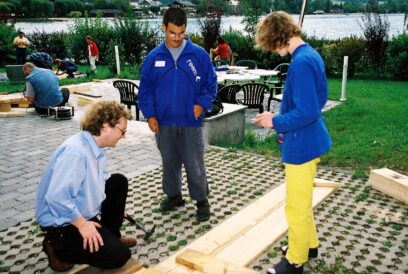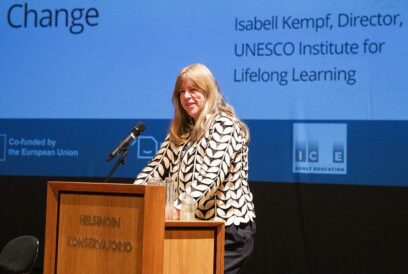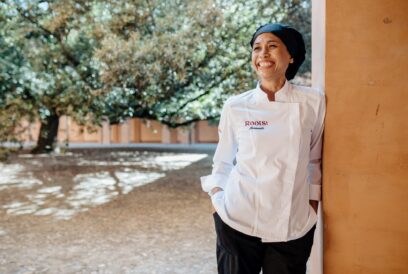

Adult education must provide meeting places in the migration age. / Photo: Matthias Ripp
Refugees and migrants as a motor to renew democracy and adult education
Published:Adult education must provide meeting places in the migration age. / Photo: Matthias Ripp
More autonomy to adult educators on curriculum. More encounters between migrants and natives. More support for progressives within migrant communities. Bernd Käpplinger proposes ideas for adult education in the migration age, in response to Magnus Dahlstedt’s earlier Elm article.
Recently, Magnus Dahlstedt argued in Elm that the “refugee crisis” poses a challenge to adult education. The challenge is not to solely foster migrants into pre-given democratic values, he argued. It is also to retain adult education’s ability to question and to discuss pre-given values.
I want to relate to Dahlstedt’s essay. We should not see refugee integration solely in terms of ‘us’ as teachers and the migrants as learners. A role of adult education is to challenge the current and to struggle for a different social order. Democracy is in constant making. This means that we have to ask questions concerning power, like the labor movement did as one driving force for adult education. This explicit focus on power is important.
Administrations prescribe adult education, as lifelong learning, for certain target groups with deficits. They are considered in need because of labor market risks. Contrarily to the labor movement, these target groups were not empowered in order to change their working situations, but rather to adapt to employers’ wishes as flexible workers. Empowerment has a new meaning. Instead striving for liberation and collective action it is meant as adapting the workforce to global capitalism. Employees should play the game, but they are not allowed to take part in deciding on rules.
Thus, the integration of migrants is in-line with this path-logic already established. It is an assimilation to the needs of the labor market. It is an issue of honesty that we as adult educators should observe our own roles much more critically. We are often not a force in changing systems, but rather a force to keep systems running. Adult educators might not like it since the emancipatory myth is different. Austrian scholars like Daniela Holzer are speaking of the ‘dark side of lifelong learning’. But it is also important to keep systems running, because the alternative is now often populistic, authoritarian and regressive. We have to find ways how we can revitalize democracy without falling into the populist trap or academic general opposition from our own safe positions.
I would like to put forward here four ideas as stimulus for practices to be established widely.
Firstly, we have to discuss who decides on the content of adult education. Presently, it is often done by narrowly defined programs of administrations. These programs are often not debated in public in any parliament, but decided within administration in closed shops with some experts. Scholars are misused as experts to deliver evaluations that support the pre-given agenda or to deliver evidence for changes already decided by new governments. We have to argue for more power for adult education institutions and professionals so they can take decisions as advocates for clients. We need creativity, anarchy and low-level decision-making. A new integration policy would shift power to the people in class rooms. Unfortunately, some adult education scholars have weakened the professional field by putting forward the agenda of self-regulated learning, which is misused by the neo-liberal agenda of LLL. Liberal scholars like Mezirow have acted here in political naivety with their writings.
Secondly, we need not only integration courses for migrants, but also spaces for the receiving communities. People fearing the consequences of migration should express their fears and learn how to handle them. Followers of authoritarian movements often have a working class background. One reason might be that people are in fear of losing jobs and housing. More educated and wealthy people should respect these fears since our own livelihoods are often the least affected. Isn’t it understandable that people are having the feeling that refugees are receiving gifts made available by past and present austerity policies? We need the commitment of ruling classes that the integration of refugees will not be covered by social cuts, but by more spending. Otherwise, it would become socially explosive. Communities with migrants should establish agoras, where people can learn about the newcomers and search for actions how to handle the new situations.
Thirdly, we need to support the differences within migrant communities. Migrants are not stereotypes. The talk about ‘our’ and ‘their’ values hides differences within groups. Within migrant communities, power struggles over class and gender are taking place. Here we should support the weak instead of reinforcing the power structures by being too tolerant like accepting Shariah law in our society. Tolerance bears the danger of indifference or cowardice. We should align with progressive forces within migrant communities. For example, we should ask ourselves what we are doing to support activists for women’s rights within migrant communities or generally to support people who want to break out of their migrant milieus? In addition, a lot of migrants are traumatized by past and present experiences. Is it enough to offer language and labor market integration courses? What about health education?
Fourthly, we need adult education programs which lead to dialogical encounters between migrants and the receiving communities. Adult and community education should create agoras within cities and villages. Xenophobia is found most in those places, where we have least migrants. Perhaps countries or politicians used to monocultures are not in fear of migrants, but rather in fear to lose the power to define monolithic communities. Meeting people is a chance to understand that we are all humans. A lot of hate is produced by images, assumptions or exaggerations with little basis in reality. Power is important since it is not enough in an agora to meet, but an agora is also a space where you have the power to debate and to decide.
To sum up, I propose these four ideas:
- To give adult educators more autonomy to decide on the educational content instead of the curricula mainly defined by administrations.
- To offer spaces where people in migrant-receiving communities can express their fear but to also learn to handle it.
- To support progressive forces and diversity within migrant communities instead of being indifferent or too tolerant.
- To create encounters between migrants and people in migrant-receiving communities in order to prevent xenophobia based on prejudices.
These ideas are more than just ideas from a scholar, but already practice in some past and present programs of adult education, which I discovered by empirical analysis of programs. Scholars can learn from practice and give it systemized feedback. It adds more to policy or discourse analysis, which are fashionable in adult education research.
Nonetheless, such practices are rare and not part of mainstream integration activities. Refugees and migration in general could be a positive motor to improve democracy and adult education, rather than a burden. Power struggles have to be fought in our democracy since much is at stake, given recent developments.
What do you think?





